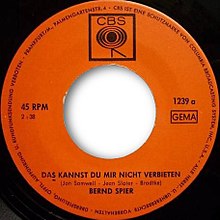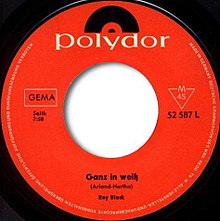Hans Bertram (music producer)
Hans Bertram , pseudonym Axel Weingarten (born April 3, 1915 in Cologne ; † January 27, 1991 ibid) was a German musician, music producer and pop composer. He was one of the most successful German record producers of the post-war period and made a significant contribution to the careers of Roy Black , Chris Roberts and Bernd Spier . In addition, he was jointly responsible for many top hits and million-seller.
Career
Hans Bertram worked mainly as a producer for the German record labels Polydor and Electrola . In a few of his own compositions, he liked to hide behind the pseudonym Axel Weingarten . Together with his future wife Elisabeth (" Lilibert ") and the composer Werner Twardy , he formed a trio that was successful in the background of hits for their creation and production.
1950s
His first productions can be traced back to 1955. In the nationwide singing competition The great chance of the record label Electrola won next to Ralf Bendix Sybille Pagel, who also received a record contract. Pagel ( Danny Mann ) was unable to land a success with her first single, Tingel-Tangel-Tingel-Tambourin / Es war ein Lama (EG # 8539), produced by Hans Bertram and arranged by Paul Kuhn . The first single Arrivederci Roma and the orchestra Adalbert Luczkowski (EG # 8527), produced on September 30, 1955 for Fred Bertelmann , was already more successful . Producer colleague Nils Nobach , who had rejected Bertelmann as a singer against Bertram's vote, was then able to achieve the first hit parade with Tina Marie on November 3, 1955 . On October 20, 1956, Marie with the cheeky look (EG # 8641) was created, which was Bertram's first hit parade with 15th place on the German charts . The great success came with the recording date July 19, 1957, when Der lachende Vagabund / Cantabamberra (the latter recorded on July 9, 1957) were leveled and published as EG # 8732. On January 25, 1958, the title reached first place on the German charts, where it remained for eleven weeks, and was sold a total of 3.5 million times, 300,000 of which were in the USA alone. I'm just a troubadour , too , recorded on January 26th, 1958 (EG # 8785) and placed sixth with a good place. In May 1958, Bertram produced the single Fräulein / Mama for Chris Howland, who had just been awarded a record deal , and it went up to third place. That made it in May 1959. I learned that in Paris , who present the humorous Howland with his distinct British accent. In that year Bertram worked exclusively for Howland, for whom he produced 5 other titles.
1960s

In 1959, Hans Bertram married the radio presenter Elisabeth Merkels, who had been a spokesperson for the German-speaking department of Radio Luxemburg since July 28, 1958 (“The Hour with Elisabeth”) and who helped set up the station's German program. When daughter Elisabeth was born, Mrs. Bertram left the station in April 1960, with which she remained in contact. Baby Elisabeth played a decisive role in father's production of the babysitter boogie for Ralf Bendix on March 28, 1961: Bendix sang the German text version of the American original and then gave "little Elisabeth" several free spaces to laugh and babble about. The record sold over a million times in Europe alone and was to remain Bendix's only top hit, awarded the Golden Record on February 17, 1962. It was made in the Cologne exhibition studio on September 17, 1961 under the direction of production by Hans Bertram for Will Brandes & Margot Eskens the title Musikanten der Liebe / I would like to be married to you (Polydor # 24647). Margot Eskens had great success under the Polydor producer Sigrid Volkmann in the 1950s. However, the new producer team under Hans Bertram was initially unable to build on the really big hits, so that it wasn't until March 1962 that a smaller success was achieved with the title Ein Herz, das one can't buy (rank 19 in the charts).
Bernd Spier, on the other hand, began his recording career after his first single on CBS with the million seller You can't forbid me and a first place in the charts. Produced by Bertram, the title published in December 1963 reached first place on January 25, 1964, which it occupied for eight weeks and which was sold 1.4 million times. As is so often the case, it was the German version of an American original, this time the Johnny Tillotson hit You Can Never Stop Me Loving You . Spiers Memphis, Tennessee from September 1964 is also a cover version of Chuck Berry 's title of the same name.
When Gerhard Höllerich appeared in a solo concert with his beat band Canons in his hometown Augsburg on August 20, 1964, Polydor producer Hans Bertram was also in the audience. He invites the band to test recordings in the Cologne studios, but only Höllerich receives a recording contract on September 1, 1964 under his stage name Roy Black. In October 1964 the first single Sweet Baby mein / My little Girl (Polydor # 52400) is released, of which only 1,200 copies are sold. The German hit parade takes no notice of this. But 800,000 copies of the third single You are not alone / Faith in me (# 52475) are sold, bring her a fourth place after its release in July 1965. The close melody with a range of only a third made it easier for broad sections of the population to sing along. At the end of 1965, Hans Bertram advised switching from Beat to Schlager. Then Bertram receives a demo tape with the title All in white / I'm looking for you , the A-side of which is about a dreamed romantic wedding in white clothes. The text by the experienced pop composer Kurt Hertha and the music by Rolf Arland (real name: Hans Heinz Mühlbauer; wrote a total of 39 titles for Black) are brought together by his son Henry Arland to create a violin-based melody. The single is sold over 2.5 million times, gold for this on January 25, 1968.
In 1966 Bertram received a demo tape from the Munich singer Christian Klusacek, who was then invited to the Polydor Studios in Cologne (Olpener Straße). Baby's Gone / Anytime were the titles that sold almost 4,000 copies under the stage name Chris Robert after their publication in November 1966. The third single When you are lonely (based on the English title Rowbottom Square ) was sold 140,000 times in March 1968 without any special promotion. While this title was only able to work its way up to 15th place, the next productions achieved better and better listings.
From 1968 Bertram increasingly used his own Hans Bertram Orchestra in music productions. In 1966 alone, Bertram produced the music album Roy Black (2nd place) and seventeen tracks for Roy Black , including Leg Dein Herz in Meine Hands (June 1966, 3rd place) and the top hit Good Night my Love (October 1966, 1st place), which Bertram's wife Lilibert had co-composed. Roy Black's wave of success continued, because Meine Liebe zu Dir , published in June 1967 , composed by Werner Twardy and Lilibert, also reached first place. In 1967 a total of 16 tracks were produced for Black by Bertram. In 1968 Hans Bertram produced 40 titles, including 31 again for Roy Black, of which I think of you , published in July 1968, came off best with a third place. With 38 titles produced by Bertram in 1969, the previous year's level was almost reached. These included 28 titles for Roy Black, in particular the top hits Das Mädchen Carina (May 1969) and the million-seller Dein Most Beautiful Gift (November 1969) as well as Die Maschen der Mädchen (December 1969, rank 8) for Chris Roberts.
The 1970s
Its most successful hit so far came in November 1970 with Ich binliebber in die Liebe , which made it to third place. That year, 16 out of 33 Bertram productions were for Roy Black and 14 for Chris Roberts. On May 26th, 1970 your most beautiful gift was awarded the gold record for Blacks . In 1971, Hans Bertram was the producer of a total of 56 titles, including 24 songs for Roy Black, 19 for Chris Roberts and 5 for the Fischer Choirs , whose first LP was released in 1971 and whose musical accompaniment from then on from the Bertram Orchestra came from. The most successful title among them was the million seller It's Nice to Be in the World ( Roy Black & Anita ), which appeared in July 1971, rose to second place and sold 1.2 million copies (Golden on April 14, 1972). In terms of the number of productions, 1972 was absolutely the most productive for Bertram. With 61 productions he reached the zenith of his creativity. With 23 titles for Roberts, he wrote more songs for the first time than for Roy Black (14). Black could not reach the top 10 that year, Roberts landed a number nine in March 1972 with a sun in his heart . From 1973 the production activities of Hans Bertram decreased noticeably, because in that year only 34 titles were created under his direction, including 15 for Roberts and 9 for Black. This had not been able to book a Top10 hit since 1972 and parted ways with Bertram on September 4th, 1975. Roy Black's titles particularly appealed to the affluent adult audience. Book author Arno Löb offers an attempt to explain the success against the music trend. After that, Roy Black's initial successes were due in particular to Elisabeth Bertram. She still had good contacts with Radio Luxemburg, was able to influence the program and preferred to play her husband's records.
Bertram discovered Tony Holiday in 1974 , but he had to wait until September 1977 for his breakthrough, when Dancing Samba became a top hit with me . From 1974 Bertram reduced his professional activities significantly. While only 20 productions were leveled in 1974, there were 16 in 1975 and only four in 1976. Then Hans Bertram withdrew from the production business.
Individual evidence
- ^ SWR about Fred Bertelmann
- ^ Joseph Murrells, Million Selling Records , 1985, p. 113.
- ↑ SWR: When babysitters dance the boogie ...
- ^ Joseph Murrells, Million Selling Records , 1985, p. 149.
- ^ Bettina Greve, Sternenhimmel - Polydor: The Chronicle of a German Record Brand , 2001, p. 144.
- ↑ Subsequent singles were named Chris Roberts
- ↑ Arno Löb, Sweet Baby Mine - Roy Black's wild youth , 1996.
| personal data | |
|---|---|
| SURNAME | Bertram, Hans |
| ALTERNATIVE NAMES | Weingarten, Axel (pseudonym) |
| BRIEF DESCRIPTION | German musician, music producer and pop composer |
| DATE OF BIRTH | April 3, 1915 |
| PLACE OF BIRTH | Cologne |
| DATE OF DEATH | January 27, 1991 |
| Place of death | Cologne |


